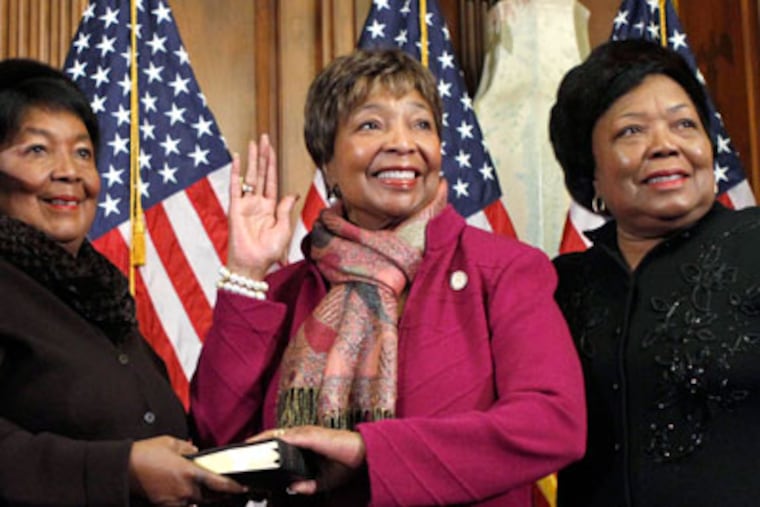Challengers eye some key blacks in Congress
DALLAS - For two decades, Eddie Bernice Johnson has been an outspoken voice for Democrats in her signature bright blazer and multicolored scarf.

DALLAS - For two decades, Eddie Bernice Johnson has been an outspoken voice for Democrats in her signature bright blazer and multicolored scarf.
Now, the first black woman to represent north Texas in Congress faces serious opposition in the May 29 primary, and the effort to unseat her is just one of several challenges against some of the longest-serving black members of Congress.
"I will always be ever more grateful for the trails that she has blazed," said Eva Jones, owner of a barbecue restaurant and chairwoman of Johnson's first House campaign in 1992. But "there has come a time where we need new leadership, like in any business, like with anything."
Some entrenched African American incumbents, such as Rep. Chaka Fattah of Philadelphia, face little or no opposition. But others in Dallas, Detroit, and New York City are being challenged by a younger generation of black office-seekers who aren't waiting for retirements by the old guard, including national figures whose activism dates to the civil rights movement.
In Michigan, several people are challenging 82-year-old John Conyers, the oldest black member of the House.
One of his rivals, State Sen. Bert Johnson, said people who have voted for Conyers for decades see that "perhaps we're not trying to integrate lunch counters" so much as staving off foreclosures in struggling neighborhoods.
"Those people know that there is a nexus between their experience and the youthful vigor and zeal that I bring to the table," said Johnson, who at 38 was born eight years after Conyers, then a civil rights activist, took office in 1965.
In Texas, Eddie Bernice Johnson's rivals take pains not to criticize her directly, but say they hear increasing doubts from voters in south Dallas neighborhoods.
"North Texas has seen a lot of economic growth. Unfortunately, this district and our community hasn't really shared in that economic development," said Taj Clayton, one of her opponents.
Johnson, 76, grew up in Waco, moved to Dallas after college, and worked as a Veterans Administration nurse. She decided to get into politics after a trip to buy a hat at a mall. "I learned . . . that I could not try the hat on," she said in 1987. "I found that black women [in Dallas] could not try on shoes. People tried them on for you, or they would measure your foot and guess your size."
She didn't buy the hat. Instead, she organized a boycott and later won a race for state representative. In 1986, she was elected to the State Senate. Six years later, she ran for the U.S. House from a district she had helped draw as a state senator.
She has been unopposed in every primary since. Johnson, who declined to be interviewed for this story, has won federal funding for mass transit and other local projects. She also has fought a Republican-backed voter ID law that she says would disenfranchise minority voters. Supporters tout her experience.
"This election is too important . . . to hand everything to a novice," said David Henderson Jr., a pastor and president of the Baptist Ministers Conference of Dallas. "We need someone with her stature, with her status."
One of her challengers, State Rep. Barbara Mallory Caraway, 56, worked for Johnson in the State Senate until Johnson fired her. Caraway, well-known for defeating incumbents in two previous races, said, "20 years is a long time to be in one elected office. . . . It's time for new leadership."
Another challenger, Clayton, 35, is a Harvard-educated lawyer and son of glass-factory workers. His campaign staff includes a former national field director for President Obama's 2008 campaign.
Redistricting has expanded the district into majority-Latino areas where voters are less familiar with all three candidates.
Johnson has not debated her opponents and has held relatively few campaign events. She said in a recent radio interview, "If you want to know my honest opinion, I don't think anybody who's running against me is ready to come to this job."
She has a coveted endorsement from Obama, who rarely takes sides in Democratic primaries.
Johnson previously headed the Congressional Black Caucus and is among its oldest members. At least two other members are in tough reelection fights - Conyers in Michigan and Rep. Charles Rangel, 81, a political mainstay in Harlem since 1971.
Rangel, convicted on House ethics charges in 2010, faces two black Democrats in his bid for a 22d term - local district leader Joyce Johnson and former national Democratic official Clyde Williams, as well as Latino State Sen. Adriano Espaillat. Latinos make up more than half of Rangel's newly redrawn district. The primary is June 26.
Another longtime New York congressman, Edolphus Towns, declined to seek a 16th term. Towns, 77, would have faced a tough primary fight against two black Democrats, and new areas were added to his Brooklyn district after redistricting.
"People are challenging at every level, and I think it's not the worst thing in the world," said former Virginia Gov. Doug Wilder, the nation's first elected black governor. "Seniority is good to the extent that it produces, and in the absence of that, the question then becomes, what have you done for me today?"